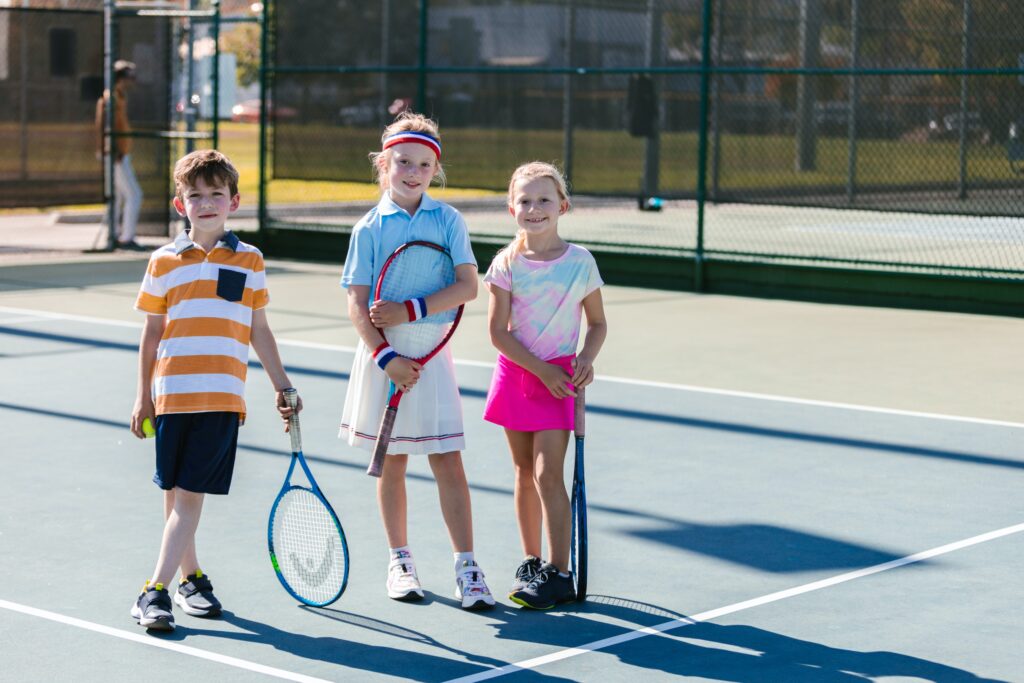Playing tennis comes with many physical, intellectual, psychological and social benefits.
1. Physical activity
Tennis is a great way to stay physically active, look after your heart and develop your musculoskeletal system. Tennis allows you to develop, improve and maintain many components of skill related fitness to include agility, balance, coordination, speed and your reaction time.
2. Concentration
Playing tennis, whether in a coaching session or competitive match, requires you to concentrate and focus for long periods of time. The discipline of maintaining concentration and focus while under pressure is a fantastic skill learnt while playing tennis.
3. Decision making
Throughout the duration of a tennis match you will need to make hundreds of decisions. Before hitting the ball you must decide what shot to play as well as the spin, speed, direction, depth and height you are going to hit that shot with. Other decisions include the tactics you are going to use, how to communicate with your partner if playing doubles, how much risk to take on each point depending on the score and how you are going to behave on court.
4. Skills for managing stress
Stress is the feeling of being under too much mental or emotional pressure. Pressure turns into stress when you feel unable to cope. Stress affects how you feel, think, behave and how your body works (1). Before playing a tennis match you may experience pre-match anxiety, worry or go over things in your head. Tools such as time management, positive self-talk and relaxation techniques can all be learnt while playing tennis.
5. Coping and self management skills
Playing a tennis match can bring about many emotions such as anger during the match and potentially coping with loss after a match. Tennis tests our emotions and what better way to learn how to deal with and manage emotions than while on the tennis court. Tools such as goal setting, self-evaluation, self-assessment and self-monitoring skills can all be learnt while playing and learning to play tennis.
6. Confidence
Confidence is the belief that you can successfully perform a desired behaviour (3). The more tennis you play the better your physical skills, psychological skills, perceptual skills, physical fitness and your ability to learn and improve (4) will be. The better you get the more confident you will become.
7. Preparation
Playing tennis can teach you that the more prepared you are the better you will perform. If you are prepared physically, mentally, technically and tactically you are more likely to win your tennis match. Being well prepared is a transferable skill you can apply to any area of your life.
8. Conflict resolution
During a tennis match some decisions may not go your way, your opponent may call the wrong score out or call a ball out that was actually in. This will result in you having to learn and develop the skill of conflict resolution.
9. Interpersonal communication skills
Communication skills are needed when working with your coach, working with a partner while playing doubles and when playing in a competitive match. Some of the skills you will develop include verbal and non-verbal communication, active listening as well as giving and receiving feedback.
10. Independence
Learning to be independent is an important skill and tennis (singles) by its very nature is a game played independently. You must prepare, make decisions, resolve conflict, manage stress, cope with pressure and problem solve alone.
11. Cooperation & team work
In tennis your team may be you and your coach, or it could be you and your doubles partner. Doubles develops your ability to work in a team and perform under pressure with the common goal of winning. Skills such as contributing to your team and expressing respect for others can can be learnt while on the tennis court.
12. Coping with pressure
There are a number of reasons you might feel under pressure in a tennis match. It could be because your friends are watching you play, it could be because there is a prize at stake if you win or because on paper you feel you should beat your opponent. There are two outcomes to a game of tennis, you win or you lose. To win, you must learn to control how you deal with the pressure you feel throughout your match.
13. Problem solving
Every player has their own game style which means as a competitor you must problem solve in order to win. Tennis is a great game to develop information gathering skills, analysis skills as well as evaluation skills. Without these skills it would be very hard to win a tennis match. Can you figure out the tactics your opponent is using? Can you adapt your game to your advantage?
14. You can play for life
If you go to any tennis club in the world you will find juniors aged 4 through to adults over the age of 60 playing tennis. There are very few sports you can start as a young child and continue to play your whole life. Tennis is also not a seasonal game and can be played all year-round making it a fantastic choice of sport to be involved with.
15. Make friends for life
One of the best things about playing tennis is the fact you will make friends for life. You could join any tennis club in the world, make friends and have a game of tennis. There are doubles pairs in some tennis clubs who have been playing with their doubles partner for over 20 years. The social side of playing tennis alone is a reason to join a club and start playing today.
Finally...
If the above is not enough to convince you to start playing tennis, what if playing tennis could add 9.7 years to your life? A study (5) that took place over 25 years with over 8500 people found that tennis is one of the best sports to play to increase your life expectancy compared to a sedentary group of people.
Tennis | 9.7 years
Badminton | 6.2 years
Soccer | 4.7 years
Cycling | 3.7 years
Swimming | 3.4 years
Jogging | 3.2 years
Health Club Activities | 1.5 years
References
1) NHS Inform (2022) Struggling with stress? Available at: https://www.nhsinform.scot/healthy-living/mental-wellbeing/stress/struggling-with-stress
2) Unicef (2019) Skills for Health. Available from: https://www.unicef.org/lifeskills/files/SkillsForHealth230503.pdf
3) Weinberg, R. S., & Gould, D. (2019) Foundations of Sport and Exercise Psychology. Champaign, IL, Human Kinetics.
4) Vealey, R. S., Hayashi, S. W., Garner-Holman, M., Giacobbi, P. (1998) Sources of sport-confidence: Conceptualization and instrument development. Journal of Sport and Exercise Psychology, 20, 54-80.
5) Schnohr, P., et al. (2018) Various Leisure Time Physical Activities Associated With Widely Divergent Life Expectancies: The Copenhagen City Heart Study. Available at: https://www.mayoclinicproceedings.org/article/S0025-6196(18)30538-X/fulltex
I hope this post was of value to you. I’d love to hear your thoughts, please do send me a message on Instagram (simonjamescoaching).
Thank you for reading.
Simon James



